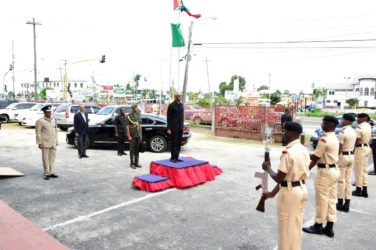Saying that crime fighting demands the adoption of “new attitudes and techniques,” President David Granger yesterday urged ranks of the Guyana Police Force (GPF) to embrace planned security reforms and avoid past mistakes.
“I haven’t come here to accuse you. I’ve come here to encourage you to embrace security reforms,” Granger was quoted by the Ministry of the Presidency as saying at the Annual Police Officers’ Conference.
According to a ministry statement, the president’s comment was made after he emphasised that there was no place for rogue officers in the GPF. “We must separate them so they don’t do further mischief and damage to the reputation of this great Force and don’t jeopardise the lives of their colleagues through their greed or through their folly… I am sure that there are [more] good officers than bad officers,” he said before highlighting planned reforms, including those that will be realised through the implementation of the United Kingdom funded Security Sector Reform Programme (SSRP).
“Change is continuous and change is compelling. What was good for 1996 may not have been good for 2006. What was good for 2006 definitely was not good for 2016 and what we need for 2017 may become obsolete in five or ten years’ time. The nature of crime, particularly trans-national crime, demands new attitudes and techniques… We have to continuously reform the criminal justice system if we are to protect our citizens from violent crimes,” he said.

According to the ministry, Granger noted that the reforms will entail crime prevention through improved intelligence and pro-active deployment, protection of victims and vulnerable groups from criminal behaviour or disorder, the promotion of greater public confidence in officers through ethical conduct and the promulgation of measures aimed at building the force’s capacity and capability.
He also said that the reforms must address the need to professionalise the force and strengthen its leadership so that it is repositioned and ready to effectively deal with threats to public safety and security in all its forms. “Continuous reform is imperative to allow the force to remain relevant, to rebuild public trust and, together with the government, citizens and civil society, to make our country safer and more secure.
It is not to build big stations; it is to ensure that every citizen is safe. The ultimate objective of our policy is to ensure that every citizen is safe–safe from anti-social behaviour, from crime, from disorder and traffic accidents,” Granger said, while assuring his government’s commitment to providing the support needed to ensure human safety for all citizens and the national security of the state in order to create the framework for national development.
Granger, according to the statement, explained that in order to combat crime, law enforcement must first determine and understand causation. It was against this background that he spoke of the secondary impact of criminal activities on communities.
He said the country is still reeling from the impact of the crime wave of the early 2000s, which spawned the emergence of drug cartels and ‘phantom squads,’ which were involved in a high number of murders. “Police officers need to understand this period, because at no other time in the history of the Guyana Police Force were so many police officers killed on duty…. It must not happen again…. We know that there were problems but let us not assume that those problems have gone away or that they cannot recur,” he added.
Granger also highlighted previous attempts to reform the police force and the price that the people paid owing to the failure of successive past governments to conscientiously implement. “This is not the time for coulda, woulda and shoulda. We know what we have to do.
We now have in 2017 to move forward. It is a time for what we will do. It is a time to introduce real reforms that will transform the force.
The past should offer lessons for the future. Mistakes, which have been made, must be corrected and avoided in the future,” he added.





